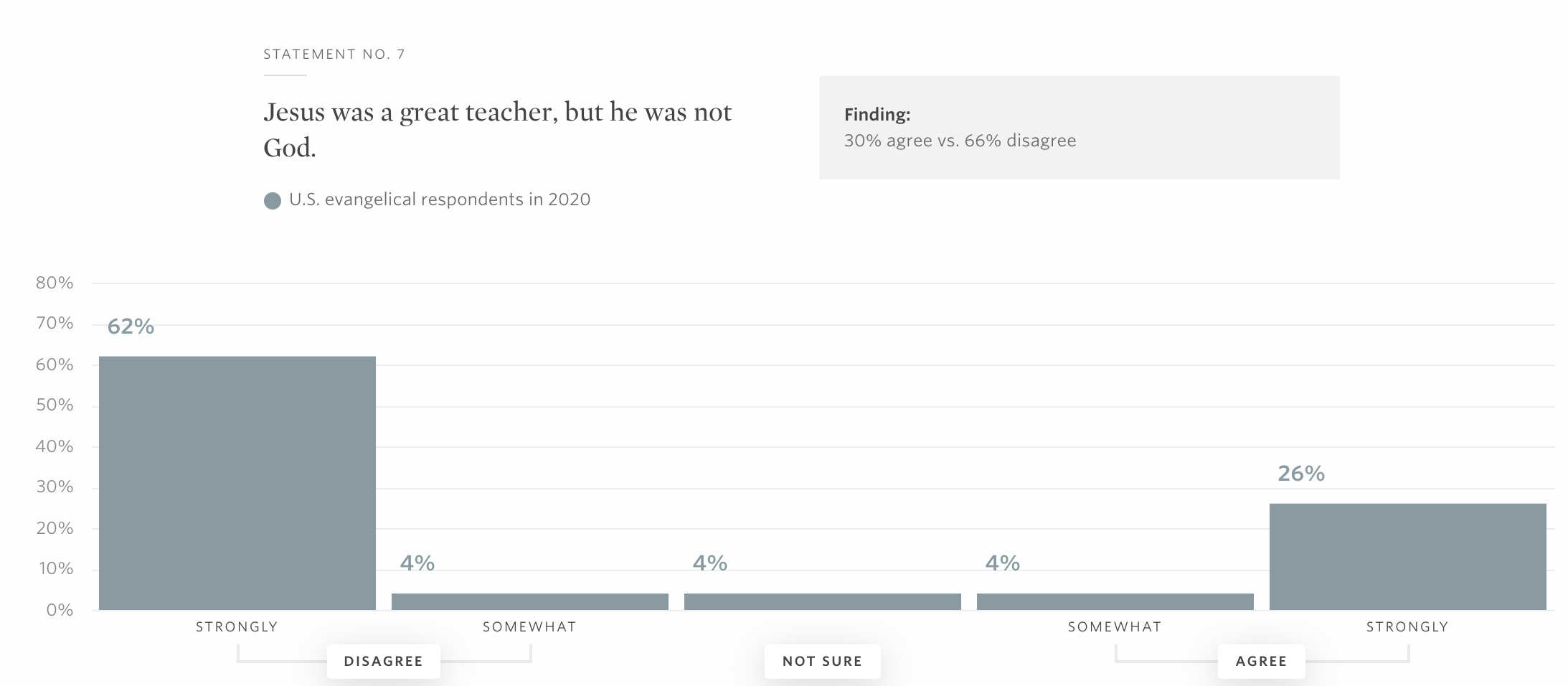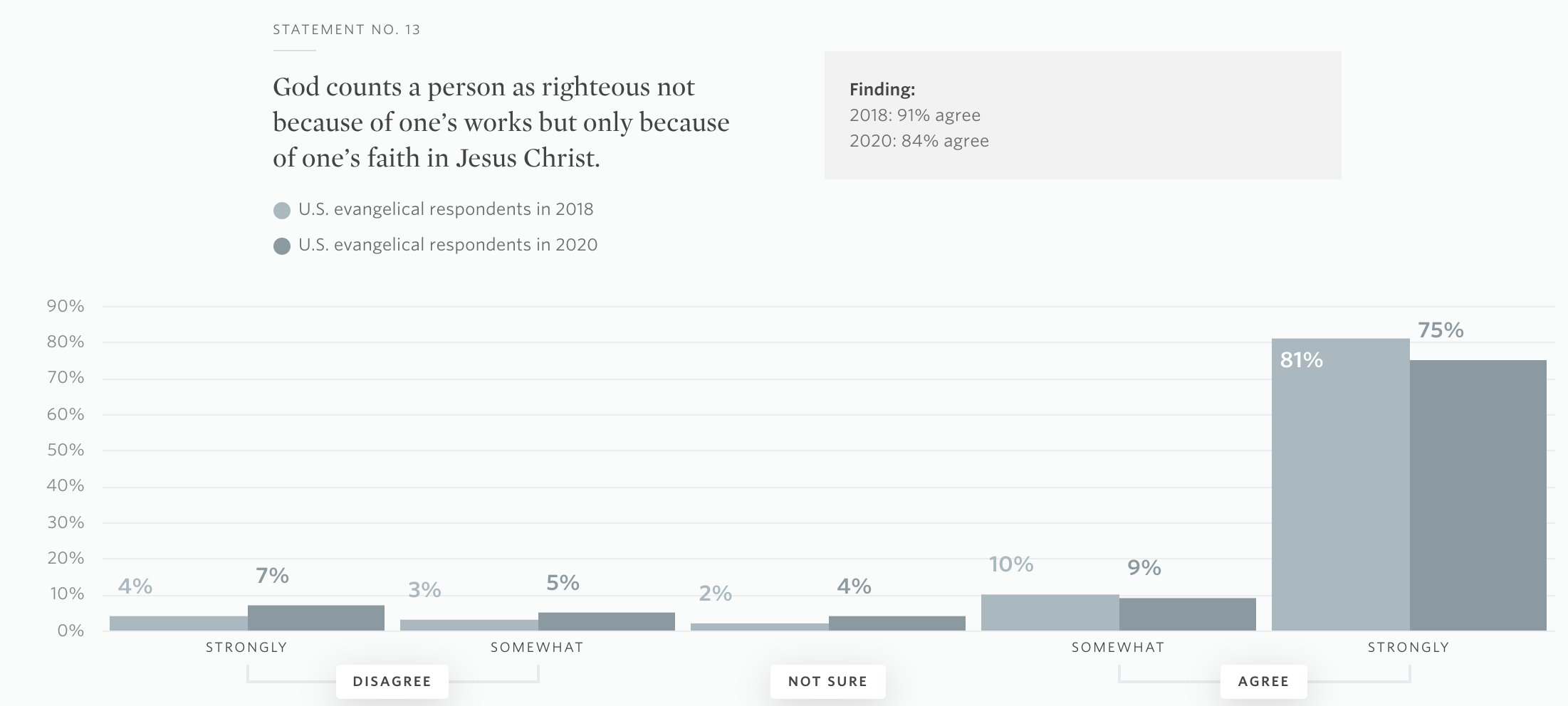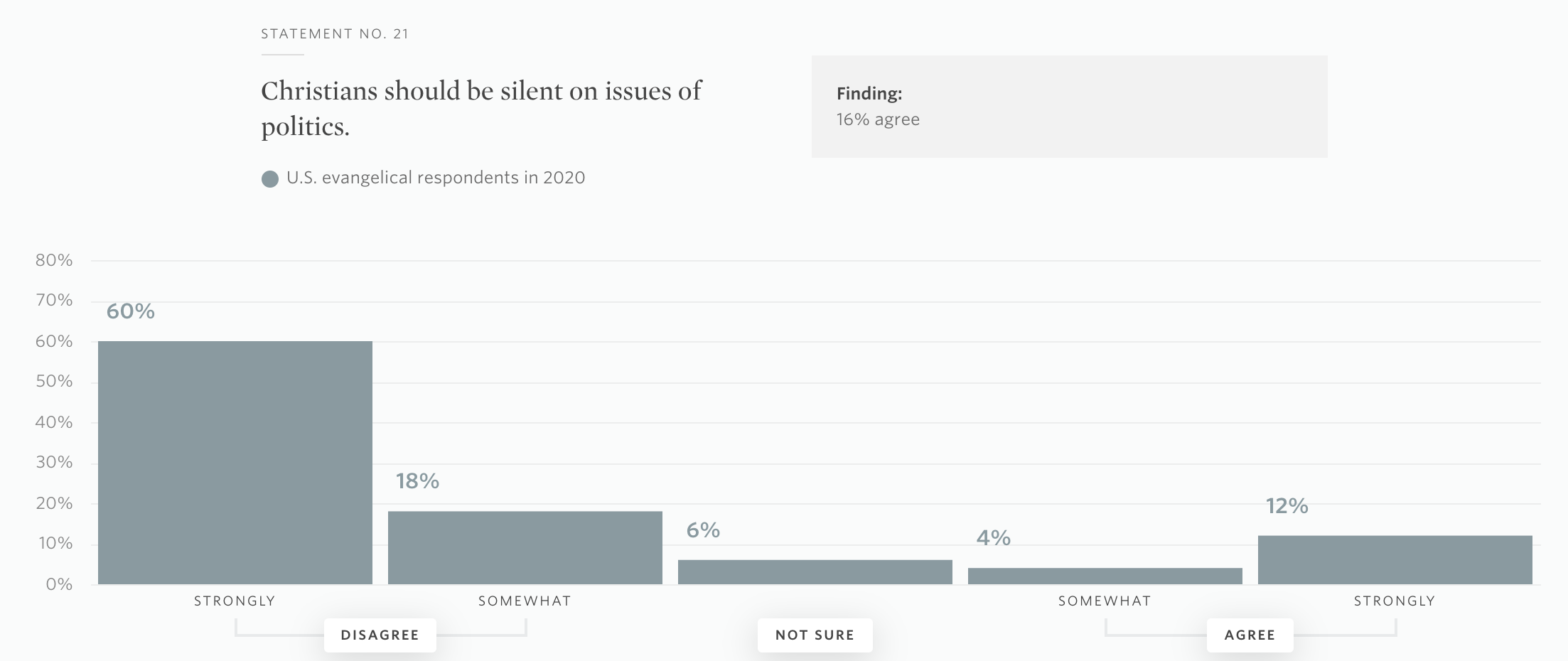In this series

In the latest survey of Americans’ theological views, evangelicals stood out for their love of their Savior and Scripture, but like the rest of the country, they still have significant gaps in belief and interpretation.
The biggest change in this year’s State of American Theology Study had to do with approaches to political engagement, with evangelicals half as likely to believe that Christians should be silent on political issues than back in 2016.
LifeWay Research, in association with Ligonier Ministries, released the results today. The two organizations have conducted the study every two years since 2014. While some questions have changed or been reworded, the report provides an opportunity to chart American theological beliefs and awareness.
The results were mixed this year, even among those the survey designates as “evangelicals by belief”—those who agreed that the Bible is the highest authority for Christian belief; that personal evangelism is very important; that Jesus’ death on the Cross was the only way to cancel the penalty of sin; and that trusting in Jesus is the only way to eternal salvation.
God, Jesus, and the Spirit
When it comes to the doctrine of God, evangelicals fare pretty well. Consistent with results from 2016 and 2018, evangelical respondents were nearly unanimous in affirming that God is a perfect being (97%); that God is a Trinity of Father, Son, and Holy Spirit (96%); and that God cares about our day-to-day decisions (87%).
There is still some confusion about whether God accepts worship from all religions, with evangelicals split—42 percent saying “yes" and 49 percent answering “no.” There were also disagreements that are unique to denominational traditions (for example, on predestination, with only 38% agreeing). By and large though, evangelicals remain pretty solid on God.
What about Jesus? When it comes to our Lord and Savior, God the Son, things get a bit more complicated. As noted by previous surveys, a disappointingly high number of evangelicals still believe the heresy of Arianism, which suggests that Jesus is not God but rather his greatest creation. Two-thirds of evangelicals (65%) affirmed the statement that “Jesus is the first and greatest being created by God.”
This figure is lower than in the last two surveys (in 2018, 78% agreed; in 2016, 71% agreed). In the 2016 survey, LifeWay added the phrase “and greatest,” resulting in a 40-point increase in positive responses. This seems to be a mitigating factor, given that evangelicals focus much of their faith on Jesus and so might be inclined to defend his greatness and overlook the phrase “created being.”
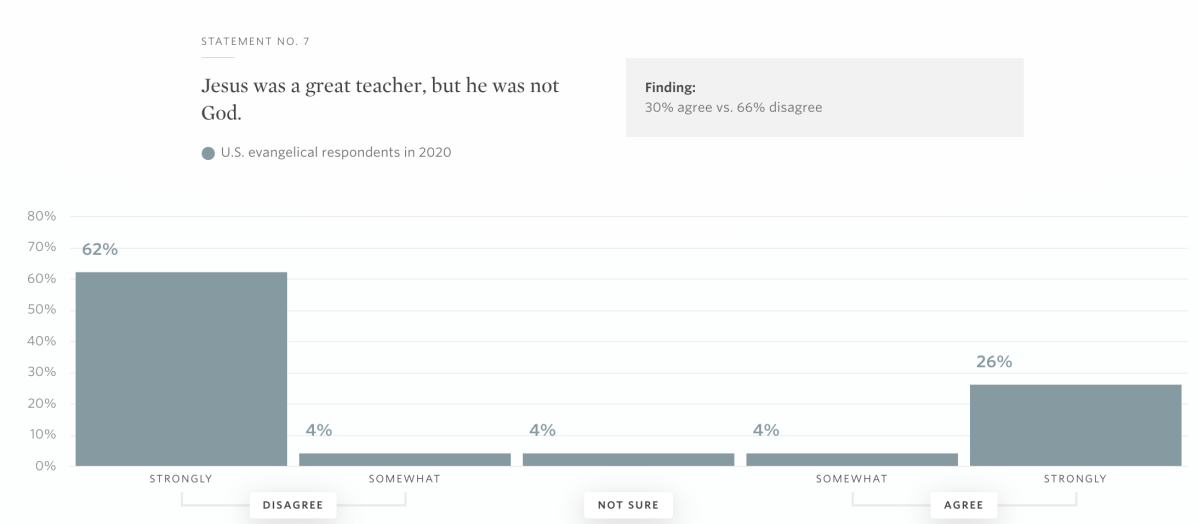 State of Theology report / Ligonier
State of Theology report / LigonierIn a question that was new to the survey this year, a sizable minority (30%) of those with evangelical beliefs do not believe that Jesus is God but instead think he is simply a “great teacher.”
While 66 percent disagree with this claim, it is concerning that nearly a third of those with evangelical beliefs do not believe that Jesus is God.
Similarly, more than 1 in 10 evangelicals (12%, up from just 8% in 2018) do not agree that “God counts a person as righteous not because of one’s works but only because of one’s faith in Jesus Christ.”
Oddly, this is a much lower percentage than the portion of evangelicals who believe Jesus is not God, but still, the number is worrisome.
 State of Theology report / Ligonier
State of Theology report / LigonierA key facet of the debate between the early church fathers and their Arian opponents was that a Jesus who was not God could not save, and faith in him would mean nothing. If two-thirds of those who don’t think Jesus is God still think salvation depends on him, then it’s fair to say that a surprising number of evangelicals lack awareness of the theology of salvation, or soteriology.
Similar confusion prevails when it comes to the third member of the Trinity, the Holy Spirit. Theologians we queried after previous surveys lamented the fact that today’s Christians don’t seem to understand the Spirit very well. Things do not appear to have improved with this year’s crop of results. Just under half of evangelical respondents (46%) believe that “the Holy Spirit is a force but is not a personal being.” This is down from previous years (56% in 2016; 59% in 2018). Furthermore, while 78 percent of evangelicals do not think the Spirit can instruct someone to do something that goes against Scripture, 18 percent do. That’s nearly 1 in 5, and that ratio remains consistent with the results of the 2018 study.
The Bible, Ethics, and Politics
When it comes to the Bible, evangelicals typically fared much better. Nearly all (98%) believe that the biblical accounts of Jesus’ resurrection are “completely accurate,” and 91 percent think the Bible overall is “accurate in all that it teaches.” Additionally, 95 percent agreed that the Bible has authority to instruct in us in what to do.
Strangely though, 18 percent of evangelical respondents believe the Bible “contains helpful accounts of ancient myths but is not literally true,” and 17 percent agree that “modern science disproves the Bible.” This appears to be at odds with their assent to the authority and accuracy of the Bible in other questions.
Greater consensus was found in matters of ethics, and especially sexual ethics. The survey found unanimous agreement (100%) with the statement that “God created male and female;” 90 percent agreed extramarital sex is a sin; 88 percent agreed abortion is a sin; and 73 percent disagreed that gender identity is a matter of choice. While these are not necessarily markers of theological orthodoxy, they do indicate a consensus arising among evangelicals based on their core evangelical beliefs.
Evangelicals are also fairly unanimous regarding hell and judgment, with 92 percent believing that hell is real and 97 percent believing that “there will be a time when Jesus Christ returns to judge all the people who have lived.”
There was a major jump in belief in Christian political engagement. This year, only 16 percent of evangelicals agreed that “Christians should be silent on issues of politics.” This is down from 39 percent in 2016, ahead of Trump’s election.
Evangelicals by belief and Americans over 65 showed the highest levels of support for Christian voices in politics and were more likely than average to say Christians should not be silent on politics this election year.
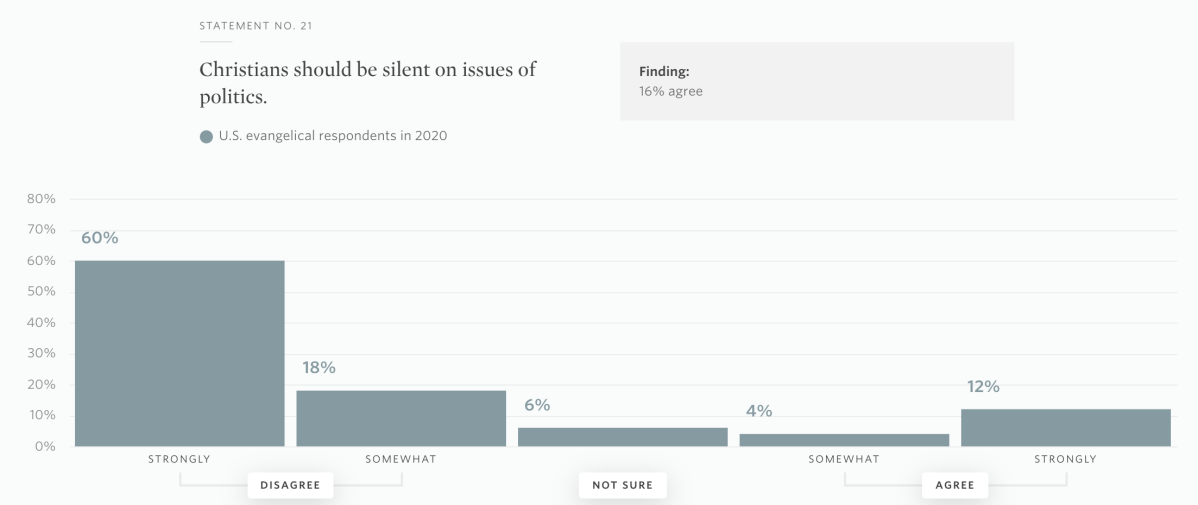 State of Theology report / Ligonier
State of Theology report / LigonierThere was also a decrease in desire for entertaining worship services (27%, down from 46% in 2016), but evangelicals remain split on whether worshiping on your own or with your family is a valid replacement for church. While the realities of COVID-19 likely would influence responses to that question, the survey was conducted in mid-March before large-scale shutdowns had begun across the nation.
Rating Evangelicals in 2020
Overall, the report card for American evangelical theological awareness and orthodoxy seems to be consistent with previous years, with improvement in some areas and decline in others.
The major standout from this survey: Evangelicals are much more orthodox than the general population when it comes to beliefs about the Bible, and they have a high degree of agreement regarding matters of sexual ethics, even in slightly greater numbers than the 2016 and 2018 surveys.
Neither of these outcomes is surprising, particularly regarding the Bible, given that one of the markers of evangelicals is their strong agreement with the statement that “the Bible is the highest authority for what I believe.” Additionally, when compared against the general population (the total 3,002 respondents), evangelicals by belief (630 respondents) consistently displayed higher agreement with statements that described Jesus positively, regardless of their orthodoxy.
As noted in reporting on previous iterations of the “State of Theology in America Survey,” the wording of the questions is likely a contributing factor to some of the confusion. Additionally, a person can qualify as an evangelical according the LifeWay’s four-question criteria and still answer questions in ways that are inconsistent with Christian orthodoxy.
For instance, someone could strongly agree that the Bible is the highest authority for what they believe while also believing that it is mostly myth and not strictly true (as about 1 in 5 evangelicals do in this year’s survey). Similarly, a respondent could say that Jesus’ death on the Cross is the only way to remove the penalty for sin and that salvation only comes through belief in Jesus but not think that he was God. There are of course theological problems with that, but based on the questions asked in this survey, it would not necessarily be inconsistent.
In the final analysis, though, this year’s findings are neither cause for concern nor cause for hope. Things seems to be very much as they were the last time we checked in with the state of the theology in America back in 2018: Many still don’t quite understand who Jesus is, don’t get the Holy Spirit, see the Bible as an authority but want the freedom to read it their own way, and care a lot about sexual ethics.
Leaders from Ligonier have likewise reiterated concern about theological shift among evangelicals.
“Statistics like these from the State of Theology survey can give us quite a shock, but they also shed light on the concerns that many American Christians and churches have expressed for decades,” said Stephen Nichols, chief academic officer of Ligonier Ministries and president of Reformation Bible College.
“As the culture around us increasingly abandons its moral compass, professing evangelicals are sadly drifting away from God’s absolute standard in Scripture. It’s clear that the church does not have the luxury of idly standing by. This is a time for Christians to study Scripture diligently, engage confidently with people in our culture, and witness fearlessly to the identity and saving work of Jesus Christ in the gospel.”
Caleb Lindgren is associate theology editor for Christianity Today.
Correction: This story originally stated that in 2016, 46 percent of evangelicals believed Christians should be silent on political issues. The correct statistic is 39 percent.










